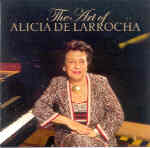This seven-disc collection commemorates pianist Alicia de Larrocha’s 80th birthday and retirement from the concert stage with an overview of her Decca recordings from the 1970s and early 1980s. Starting chronologically, Larrocha’s Bach utilizes the piano’s full dynamic and expressive gamut. Her crisp, infinitely varied articulation and tonal warmth enliven the Italian Concerto, Sixth French Suite, and the F minor concerto (its slow movement will melt your heart, money back guaranteed!), plus selected chorale prelude arrangements. To prove how her tiny hands could make colossal sounds without banging, listen to her pull out the Bach/Busoni Chaconne’s virtuoso stops and still manage to draw attention to the music rather than to the pianist. Mozart’s A major K. 331 and D major K. 576 sonatas do not represent Larrocha’s Mozart at its sparkling best (I’d have reissued her D minor fantasy instead), while her elegant, rounded Beethoven Bagatelles Op. 33 soften the music’s brusque edges. But her Haydn D major concerto and Andante con variazioni are perky, polished, and rhythmically acute.
In contrast to the classical poise Murray Perahia, Sviatoslav Richter, and Jean-Yves Thibaudet bring to Mendelssohn’s Variations Sérieuses, Larrocha underlines the work’s innate Romanticism with a wider degree of tempo variation from movement to movement. In Chopin, however, Larrocha’s spontaneity spills over into mannerism. Her overstretched phrases and lingerings throughout the F minor concerto make the music wander and lose focus. Such an approach works better for some of the Op. 28 Preludes than others, like her dazzling left-hand runs in the G major and her songful, effortless dispatch of the E-flat major’s rotary patterns. But she doesn’t clarify the F-sharp minor’s melody, bass, and inner filigree with the voice leading and timbral organization that distinguish Pollini, Arrau, Perahia, Pires, Sokolov, and Biret, among others. Her hesitating before virtually every downbeat in the Berceuse gets pretty old by the third or fourth time.
The Schubert B-flat sonata finds Larrocha in restless fettle as she injects Schubert’s long lines with superfluous caesuras and twitchy tempo adjustments while randomly zeroing in on the mantra-like repeating eighth-note accompaniment figures that dominate the long first movement. Her rhetorical distensions in the Liszt B minor sonata are more purposeful and stylistically apt. While Larrocha’s Schumann Concerto with Charles Dutoit at the helm suffers from a sluggish finale, the C major Fantasy stands out for its volatile contrasts and a powerfully sculpted central March that’s far more dynamic and assured than the pianist’s RCA remake.
The collection’s sixth disc covers Spanish music from Soler and Turina to Falla, Mompou, and Montsalvatge, with Albéniz and Granados at the core. No one played this repertoire better than Larrocha did. Differently, yes, but not with her idiomatic diction and profound sense of timing. I’m happy that Decca chose the pianist’s earlier and superior Falla Noches en los Jardines de España for reissue. Likewise, I prefer her plusher, more poetic Decca Ravel Left Hand Concerto to her more matter-of-fact RCA traversal. And the Khachaturian Concerto has rarely been served better on disc. Larrocha transforms flashy exoticisms into something more limpid and aristocratic, helped by Rafael Frühbeck de Burgos’ breathtakingly detailed support and superb sonics. In all, the collection judiciously profiles Alicia de Larrocha’s thrilling strengths and curious limitations, providing plenty of grist for pianophiles’ mills. However, newcomers to Larrocha’s art should first acquire her incomparable 1970s Decca Albéniz Iberia and Granados Goyescas recordings before investing in this set. [9/9/2003]
































